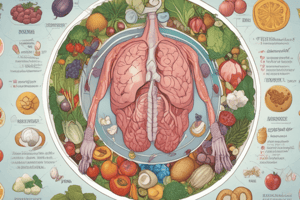Podcast
Questions and Answers
What is the primary role of vitamins in the body?
What is the primary role of vitamins in the body?
- To help release energy from food (correct)
- To provide the main source of energy
- To act as a sole nutrient source
- To build muscle tissues directly
Which category of food primarily helps your body grow bigger and stronger?
Which category of food primarily helps your body grow bigger and stronger?
- Grow Foods (correct)
- Go Foods
- Processed Foods
- Glow Foods
What impact do minerals have on your body?
What impact do minerals have on your body?
- They promote healthy skins and enhance taste perception (correct)
- They convert dietary fiber into proteins
- They help with the metabolic breakdown of carbohydrates
- They solely provide energy for daily activities
Which food category is most crucial for providing essential vitamins and minerals?
Which food category is most crucial for providing essential vitamins and minerals?
Which statement accurately reflects a role of vitamins in the body?
Which statement accurately reflects a role of vitamins in the body?
What role do proteins play in the body?
What role do proteins play in the body?
Which of the following is a primary function of unsaturated fats?
Which of the following is a primary function of unsaturated fats?
Why is it important to consume micronutrients?
Why is it important to consume micronutrients?
What is the most important source of quick energy in your diet?
What is the most important source of quick energy in your diet?
How can an inadequate intake of nutrients affect health?
How can an inadequate intake of nutrients affect health?
Flashcards are hidden until you start studying
Study Notes
Nutritional Basics
- Inadequate Nutrient Intake: Can result in low energy, chronic diseases, and serious health issues.
- Nutrient Types:
- Macronutrients: Needed in larger amounts; includes carbohydrates, proteins, and fats.
- Micronutrients: Needed in smaller amounts; includes vitamins and minerals.
Macronutrients
- Carbohydrates:
- Comprises sugars, starches, and fibers; found in fruits, grains, and vegetables.
- Primary energy source, easily broken down into glucose for muscle and brain use.
- Proteins:
- Made of amino acids; functions as hormones, enzymes, and antibodies.
- Essential for bodily structures such as connective tissues, skin, hair, and muscle fibers.
- Fats:
- Unsaturated fats aid metabolism, improve blood flow, and promote cell growth.
- Important for the absorption of fat-soluble vitamins A, D, E, and K.
Micronutrients
- Vitamins:
- Crucial for energy release from food, protein synthesis, and cell multiplication.
- Play roles in collagen production, wound healing, vision protection, and disease defense.
- Minerals:
- Maintain water balance and stabilize protein structures.
- Essential for oxygen transport and sensory functions like taste and smell.
Food Pyramid
- Purpose: Visual guide for maintaining a balanced diet based on food groups.
- Basic Food Groups:
- Go Foods: Provide fuel for activity (e.g., bread, rice, pasta).
- Glow Foods: Vegetables and fruits that supply essential vitamins and minerals.
- Grow Foods: Promote growth and strength (e.g., meat, fish, dairy).
Body and Fitness Calculations
- BMI: Body Mass Index calculation for assessing body weight relative to height.
- DBW: Desired Body Weight calculation to determine target weight goals.
- TDEE: Total Daily Energy Expenditure to gauge daily calorie needs.
Training Principles
- Support Teams: Effective performance often involves collaborative support.
- Emotional Aspects: Mental state and context significantly impact performance.
- F.I.T.T Principles: Considerations for Frequency, Intensity, Time, and Type in training.
Fitness Components
-
Skill-related Components:
- Balance: Ability to maintain posture.
- Coordination: Harmonizing body parts and senses.
- Speed: Quick movement or distance cover.
- Reaction Time: Promptness in response to stimuli.
- Agility: Quick body position changes and control.
-
Health-related Components:
- Cardio-respiratory Endurance: Sustaining whole-body exercise for extended periods.
- Strength: Maximum force produced by muscles.
- Muscular Endurance: Ability to perform repeated muscle actions without fatigue.
Studying That Suits You
Use AI to generate personalized quizzes and flashcards to suit your learning preferences.




